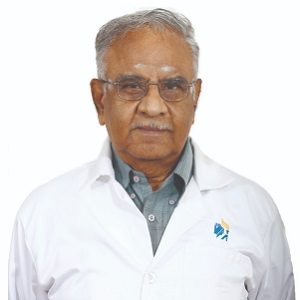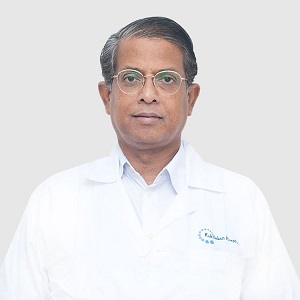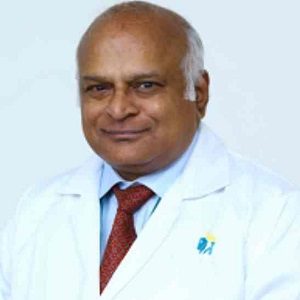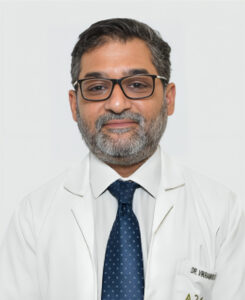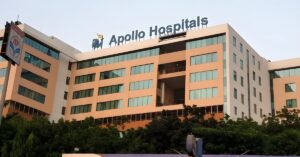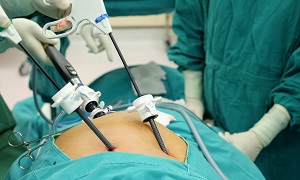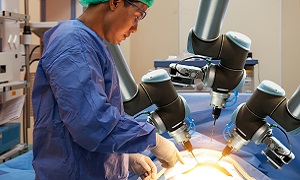Best Doctors in India for Cystectomy Surgery
- Urologist, Chennai, India
- Over 45 years’ experience
- Apollo Hospitals Greams Road
Profile Highlights:
- Dr. Duraisamy S is one of the best Urology surgeons and General physicians in South India with more than 45 years of experience.
- Dr. Duraisamy considers his profession a special mission, a devotion that calls for involvement, respect, and willingness to help others.
- He published several papers on UTI, uterovaginal fistula, ureteric diverticulum, and Endoscopy in reputed medical periodicals.
- Top Urologist | Apollo Hospital, New Delhi, India
- 30+ Years Experience
- Indraprastha Apollo Hospital, New Delhi
Profile Highlights:
- Dr. Vipin Arora is a well-known Urologist in Delhi who has been practicing for more than 30 years with success.
- Currently, he is working as a senior consultant for Urology & Andrology at Apollo Hospital, New Delhi.
- Dr. Arora specializes in prostate diseases, Uro-Oncological surgeries, and laparoscopy procedures. He is the frontrunner in Robotically- assisted laparoscopic radical prostatectomy, Urologic oncology.
- Dr. Arora pioneered the Robotic Prostate Surgery technique in India.
- He also offers CAPD, Extracorporeal shock wave lithotripsy, Flexible Ureteroscopy, Laser treatment, Polycystic Kidneys treatment, Cadaver and Live Renal Transplant, GU prosthetics, Stress Incontinence surgery TVT TOT, and TURP.
- Top Urologist | Apollo Hospital, New Delhi, India
- 42+ Years Experience
- Indraprastha Apollo Hospital, New Delhi
Profile Highlights:
- Dr. Suresh Kuamr Rawat is one of the best Urologists in India, having a grand experience of 42 years in the field.
- His services extend into prostrate laparoscopy, TUIP, TURP, minimally invasive surgery, etc.
- Dr. Suresh Rawat is practicing as a consultant with the Department of Urology at Apollo Hospitals, New Delhi.
- Dr. Rawat specializes in neuromuscular disorders, Andrology, and complex urological surgeries. He is an expert doctor for Endourology, Uro oncology, Reconstructive Urology, Female Urology, and Pediatric Urological treatment.
- Top Urologist and Kidney Transplant Surgeon | Kokilaben Hospital, Mumbai, India
- 30+ Years Experience
- Kokilaben Dhirubhai Ambani Hospital
Profile Highlights:
- With over 30 years of experience, Dr. Bejoy Abraham has worked as a consultant at premier institutes such as CMC, Vellore, and Addenbrookes Hospital, Cambridge, UK.
- He has vast experience in kidney transplant, management of kidney stones, cancer conditions of the bladder, reconstructive urology, erectile dysfunction as well as Pediatric urology.
- Urologist, Chennai, India
- Over 39 years’ experience
- Apollo Hospitals Greams Road
Profile Highlights:
- Dr. Murali Venkatraman is a Senior Urologist from India with vast experience.
- Being a fellowship holder in Laparoscopic Urology, he specializes in Laparoscopic Urology.
- Dr. Venkataraman is serving for the last 39 years and has received many awards and recognitions for his contribution.
- Urologist, Chennai, India
- Over 37 years’ experience
- Apollo Hospitals Greams Road
Profile Highlights:
- Dr. Thirumalai Ganesan Govindasamy is a well-known Urologist of India.
- He has interests and specializations in Laparoscopic and Robotic Urology, Robotic and Laparoscopic Donor Nephrectomy, Urethral Reconstructive Surgery, Per-cutaneous Nephrolithotomy, and Flexible Ureteroscopy.
- Serving his patients for almost 37 years, Dr. Govindasamy has gained enough recognition and trust from his patients and has cured many people of severe illnesses.
- Urologist & Kidney Transplant Surgeon
- 20+ Years Experience
- Artemis Hospital, Gurgaon
Profile Highlights:
- Dr. Vikram Barua Kaushik is a highly experienced urologist with a specialized focus on organ transplantation and advanced urological procedures.
- He currently serves as the Chief of Urology, overseeing the Kidney Transplant Program and Robotic Surgery (Unit II) at Artemis Hospital in Gurugram, New Delhi.
- His clinical focus includes urinary stone disease, cancers of the genitourinary tract, prostatic disease, urinary incontinence, and neurogenic bladder dysfunction.
Best Hospitals in India for Cystectomy Surgery
- City: New Delhi, India
Hospital Highlights:
- Equipped with 650 beds, BLK-Max Super Speciality Hospital is the largest stand-alone private sector hospital in Delhi.
- With over 1500 healthcare providers and 150 globally renowned super specialists, the hospital is one of Asia’s largest BMT Centres. The hospital is known for having some of the best cancer doctors in the country.
- The hospital is NABH and NABL accredited and was inaugurated by the first Prime Minister of India. Pt. Jawahar Lal Nehru.
- City: Hyderabad, India
Hospital Highlights:
- Located in the vibrant city of Hyderabad, Apollo Health City is a world-renowned medical facility that provides outstanding care and treatment to patients coming from different parts of the world.
- Founded in 1988, this 550-bed multispecialty hospital with 50 specialties and 12 Centres of Excellence continues to deliver outstanding outcomes for patients with the simplest to the most complicated medical conditions.
- Backed by the latest medical equipment and a dedicated team of professionals, the hospital provides comprehensive treatment across various specialties including, cardiology, critical care, neurosciences, cancer, orthopedics, gynecology, ENT, transplants, gastroenterology, etc.
- Apollo Health City is a cutting-edge healthcare facility that combines various facilities under one roof. These may include state-of-the-art physical medicine, rehabilitation, and wellness services with education, research, telemedicine, innovative medical devices, disease management programmes, and medical talents.
- The hospital is known for offering top-notch cancer treatment accompanied by cutting-edge facilities and technology.
- The hospital also offers a broad spectrum of cosmetic procedures that improve not just appearance but also comfort.
- In 2011, Apollo Health City was the recipient of the Asian Hospital Management Award (AHMA).
- In 2013, the Government of India recognized Apollo Health City as the top medical tourism destination in the country.
- City: Mumbai, India
Hospital Highlights:
- Kokilaben Dhirubhai Ambani Hospital, Named after the wife of Indian industrialist Dhirubhai Ambani, the founder of Reliance Industries, this is one of the top hospitals in Mumbai. This 750-bed multi-specialty hospital became operational in 2009. Known as one of India’s most advanced tertiary care facilities, the hospital is designed to raise India’s global standing as a healthcare hub, with an emphasis on excellence in clinical services.
- Kokilaben Dhirubhai Ambani Hospital uses Protocol and Care Pathway based treatment models to ensure the best outcomes for patients.
- The hospital represents a confluence of top-notch talent, cutting-edge technology, state-of-the-art infrastructure, and, most importantly commitment.
- The hospital also holds the accreditation of the NABH, NABL, CAP, and JCI.
- The hospital has been recognized as the No. 1 Multispecialty Hospital in Mumbai and the West Zone for the fifth year in a row in 2020 by The Week.
- City: Chennai, India
Hospital Highlights:
- Apollo Cancer Centre in Teynampet, Chennai is one of the best super speciality hospitals in India. It is the country’s first ISO-certified healthcare facility.
- Additionally, it is the first hospital in Chennai and the first oncology hospital in India to receive NABH accreditation.
- The hospital provides advanced tertiary care in oncology, orthopedics, neurology and neurosurgery, head and neck surgery, and reconstructive and plastic surgery.
- Additionally, it offers specialized healthcare of international standards with results comparable to those of the best hospitals in the world.
- It is outfitted with 300 beds, the newest and greatest technology, a large pool of highly qualified specialists, and a committed team of medical and paramedical professionals.
- It is one of the first few medical facilities in India to offer comprehensive cancer care. A team of skilled medical, surgical, and radiation oncologists makes up the Tumour Board, which is a component of the complete treatment planning system. After reviewing reported cases, the Board determines in concert with diagnostic specialists what course of action is best for each individual patient. The panel is further supported by dieticians, medical counselors, speech therapists, and other pertinent specialists.
- The hospital launched the first ExcelsiusGPS® Spine Robot in South India and has completed over 50 surgeries till date.
- It is also one of the few cancer hospitals in India to offer Cyber Knife therapy. Till now it has completed 1320 Cyber Knife therapies.
- The institution is also one of the few in India with the capacity to do transplants and find a prospective unrelated donor. The hospital has performed over 1000 BMTs till now.
- Furthermore, it has an exceptional milestone of performing exultant Micro vascular free tissue transfer and Aesthetic surgeries on more than 1000 patients with success.
- City: Chennai, India
Hospital Highlights:
- Apollo Hospitals, Chennai, is one of the best hospitals for heart care in India. Over the years, Apollo has expanded all over India, as a healthcare chain.
- India’s first ‘Only Pancreas’ transplant was performed in Apollo Hospital. The hospital is known for successfully performing Asia’s first en-bloc combined heart and liver transplant, and over the years, it has attained a remarkable achievement in the global healthcare space. Around 3-4 organ transplants are performed in the hospital per day.
- Equipped with over 500 beds, this hospital in Chennai was established in 1983 and since then has been among the most preferred hospital for patients from all over the world.
- The hospital holds accreditation of the NABH and JCI and is the first hospital in India to be ISO 9001 and ISO 14001 certified. It is also the first South Indian Hospital to receive subsequent reaccreditation from the JCI USA 4 times.
- City: Chennai, India
Hospital Highlights:
- Established in 1999, Gleneagles Global Hospital, Chennai, is one of the top healthcare facilities in Southern India. It is part of the Gleneagles Hospital Chain, which is the fourth largest healthcare chain in the country. The hospital specializes in multi-organ transplants of kidneys, liver, lungs, heart, etc.
- The hospital has an excellent infrastructure and state-of-the-art lab and equipment set-up. The hospital boasts cutting-edge technologies, a highly skilled team of doctors and surgeons, and trained support staff. Located in Perumbakam, Chennai, it is one of India’s premier health care destinations. The hospital has performed some of the most complex surgical and clinical procedures in India including multi-organ transplantations.
- The hospital’s lung transplantation program is one of the best in the country. The hospital is known for having performed India’s first single lung transplant and first minimal invasive lung transplant. It is also the only Indian hospital to be associated with King’s College Hospital, London, United Kingdom for liver transplantations.
- City: Hyderabad, India
Hospital Highlights:
- KIMS Hospital (a brand name of Krishna Institute of Medical Sciences) is one of the largest and best multi-speciality hospitals in Hyderabad. The hospital provides various treatments to an enormous number of patients.
- The hospital has a capacity of more than 3000 beds. KIMS Hospitals offers different healthcare services in more than 25 specialities and super specialities.
- The hospital is equipped with modern medical equipment and technology. It has robotic equipment to provide minimal invasive techniques for patients.
- The hospital is aimed at providing world-class healthcare facilities and services at an affordable cost for patients.
- The various specialities and departments of the hospital include neurosciences, gastroenterology & hepatology, robotic science, reproductive sciences, dental science, oncological sciences, organ transplantation, heart and lung transplantation and mother and child care.
- City: Kolkata, India
Hospital Highlights:
- Established in 2003, Apollo Gleneagles Hospitals is a 750-bed multispecialty tertiary care hospital situated in Kolkata.
- With 33 Centres of Excellence and more than 50 specialties, Apollo Gleneagles Hospitals, Kolkata is capable of handling all sorts of patients.
- This tertiary care hospital, which is a 100% subsidiary of Apollo Hospitals Enterprise Ltd., India, is regarded as one of Kolkata’s top hospitals.
- The facility is a complete blend of cutting-edge technology, state-of-the-art infrastructure, and genuine hospitality.
- Focusing on numerous specialties, the hospital provides all-inclusive medical treatments supported by cutting-edge technology and a staff of highly qualified medical specialists.
- Patients across the globe come to Apollo Gleneagles Hospitals Kolkata for their treatment. Moreover, international patients receive full attention and assistance for their treatment and are provided with a hassle free experience.
- Apollo Gleneagles Hospitals, Kolkata is the only hospital in Eastern India to hold the Joint Commission International (JCI) certificate.
- It is also the only hospital in Kolkata to hold the NABL accreditation in six different categories, which includes Clinical Biochemistry, Clinical Pathology, Hematology & Immunohematology, Microbiology & Serology, and Histopathology & Cytopathology.
- Furthermore, Apollo Gleneagles Hospitals, Kolkata is known for performing the first ever Reverse Shoulder Prosthesis Replacement in East India.
- City: Bengaluru, India
Hospital Highlights:
- Established in 1991, Manipal Hospital, Old Airport Road, Bangalore is the flagship facility of the Manipal Hospitals Group, which is one of the largest networks of Multispecialty Private Hospitals in India.
- The facility is well-known for its state-of-the-art technology, performance-driven, patient-centric, and evidence-based approach.
- The facilities offered at Manipal Hospital meet the highest international standards, allowing the hospital to attract a large number of national and international patients.
- Their expertise encompasses the diagnosis and treatment of a wide range of diseases in several specializations that address both simple as well as complex medical procedures.
- There are total 600 beds accessible in the hospital for the in-patients so they may heal while being closely watched after by the medical team. In addition, it has 144 critical care units, including NICUs, ICCUs, and ICUs. Apart from that, the hospital also offers 20 contemporary, modular state-of-the-art operating rooms with all the amenities needed.
- The hospital has several departments that are overseen by highly skilled, certified, and experienced medical experts.
- One of the best departments in the hospital is that of the Cancer department which is known for its advanced cancer diagnosis and treatment facilities such as Intracavitary Chemotherapy, Biological Therapy, HIPEC, PIPEC, Nuclear Medicine, Radiation Therapy, etc.
- It is one of the few hospitals in Bangalore that provides full range of pediatric services, including pediatric emergency services, pediatric gastroenterology, pediatric neurology, pediatric cardiology, pediatric orthopaedics, pediatric allergies, pediatric immunology, and infectious diseases.
- Furthermore, Manipal Hospital, Old Airport Road, Bangalore is also regarded as one of the best hospitals for bone and spine related disorders.
- City: Mumbai, India
Hospital Highlights:
- Established in 2016, Apollo Hospitals, Navi Mumbai is one of Maharashtra’s most advanced multispecialty hospital. This 500-bed hospital provides sophisticated treatments and integrated super specialty services under one roof.
- The hospital features a cutting-edge infrastructure that houses 13 state-of-the-art operating rooms, advanced laboratory and medical diagnostics, and 120 ultra-modern I.C.U. beds, including N.I.C.U. and P.I.C.U., monitored round the clock by critical care specialists.
- With 57 specialties and subspecialties, the hospital boasts a team of renowned medical specialists who offer accurate diagnosis and treatment with easy accessibility to their patients.
- Additionally, the hospital offers highly customized, individualized health check programs that are made to fit each person’s needs in terms of lifestyle.
- Apollo Hospitals, Navi Mumbai has been accredited by both the National Accreditation Board for Hospitals and Healthcare Providers (NABH) and the Joint Commission International (JCI).
- Apollo Hospitals Navi Mumbai has been awarded the “Best Practices-International Services Award” at the annual awards for service excellence and operations excellence.
CYSTECTOMY
Cystectomy, which is also known as bladder removal surgery, is a surgery for removing the urinary bladder. In men, having the entire bladder removed usually includes the removal of the prostate as well as seminal vesicles. In cases of women, cystectomy involves the removal of the uterus, ovaries, and parts of the vagina.
A surgeon needs to create a urinary diversion as well, after removing the bladder. This is to store urine and have it leave the body. There are several ways that urine can be stored as well as eliminated after removal of the bladder. Your doctor is able to decide which method is the best for you.
Cystectomy is generally performed for treating invasive or recurrent noninvasive bladder cancer. Cystectomy might also be performed for treating any kind of other pelvic tumors.
Purpose
Cystectomy can be performed for several reasons. Some of them include:
- Cancer that begins in the bladder or that begins nearby and grows to involve your bladder
- Birth defects affecting your urinary system
- Neurological or inflammatory disorders affecting your urinary system
The type of cystectomy and reconstruction that will be performed can depend on several factors, such as the reason for your surgery, your overall health, etc. You can discuss with your surgeon which procedure is best for you.
Preparation
Before your procedure, you will need to discuss with your doctor regarding any medicines that you take or whether you use any caffeine, alcohol, or any such drugs. You might also need to make changes to your medications, or avoid certain substances to help with your recovery after the surgery.
If you smoke, it is best to quit it before your surgery. Smoking is a risk factor for bladder cancer, and it also increases any risk of developing problems after the surgery.
After your surgery is scheduled, you are going to receive specific instructions on how you can prepare for it.
Procedure
Depending on your condition, your procedure can be of two types:
Partial cystectomy
In partial cystectomy, only a part of your bladder is removed. Usually, lymph nodes nearby are also removed to determine whether any cancer has spread beyond your bladder.
Radical cystectomy
In a radical cystectomy, surgeons remove your entire bladder and the lymph nodes near it. Surgeons generally almost always cut the vas deferens and remove any prostate and seminal vesicles. For women, doctors generally remove the uterus, fallopian tubes, ovaries, cervix, and in some cases, parts of the vaginal wall.
Ways of surgery
There are generally three ways in which the surgery might be performed:
Minimally invasive surgery
Open surgery
Robotic surgery
You will first receive general anesthesia that helps to keep you asleep throughout the surgery. Once you are asleep, the surgeon will be cutting into your abdomen. In the case of open surgery, there will be one large incision, while in the case of minimally invasive or robotic surgery, there will be several smaller incisions.
Next, your surgeons remove the bladder along with the lymph nodes nearby. Your surgeon might also need to remove other organs near the bladder including the urethra, prostate, and seminal vesicles in men. In cases of women, it includes the urethra, uterus, ovaries, and parts of the vagina.
After your bladder is removed, your surgeon will need to reconstruct the urinary tract so that urine can pass the body. This can be done in various ways.
- Ileal conduit- In this method, the surgeon disconnects a short portion of your small intestine known as the ileum. The ureters, i.e. the tubes carrying urine from the kidney to the bladder, are attached to one end of the ileum. The other end of the ileum can be attached to an opening in the skin which is known as a stoma. The stoma is generally located close to your belly button on your right side. For collecting urine, a plastic appliance, known as an ostomy bag is placed over the stoma.
- Continent cutaneous diversion- In this method, your surgeon creates a reservoir for storing urine from parts of your small and large intestine. The ureters are attached to one end of the reservoir. The other end of the reservoir is meanwhile connected to a small opening known as a stoma, in the skin of the abdomen. The reservoir is able to store urine and it needs to be emptied periodically by inserting a small drainage tube known as a catheter into the stoma. There is a need for an external bag.
- Neobladder- In this method, your surgeon uses a long piece of the small intestine for creating a reservoir for storing urine. These ureters are attached to one end of the reservoir, while the other end of the reservoir is connected to your urethra, the tube carrying the urine out of your body. You can empty your reservoir periodically by relaxing the pelvic muscles and tensing the abdominal muscles.
After the Procedure
You might require staying at the hospital for around five-six days after your surgery. This time is generally required so that your body is able to heal from the surgery. The intestines tend to be the last part to be awake after the surgery, and therefore you might need to be in the hospital until the intestines are again ready for absorbing fluids and nutrients.
On the day after the surgery, your healthcare team will likely have you get up and walk. Walking can help to promote healing and it can also help your bowel function to return. It improves your blood circulation as well and also prevents joint stiffness and blood clots.
You might also experience some pain or discomfort around the incision or incisions for some weeks after your surgery. As you continue to recovery, your pain is going to get better gradually. Before you get discharged from the hospital, you will need to talk with your doctor about medications and any other ways to improve your comfort.
It is also likely that you will be seeing mucus in your urine since the piece of intestine used in the procedure will still be making mucus like the intestines normally do. Over time, you will be seeing less mucus in your urine, though it is likely that it will never go away completely.
Few weeks after your surgery, you will likely need to return for follow-up appointments. Your doctor will check to make sure that your upper urinary tract drains adequately and you don’t experience any electrolyte imbalances.
If the cystectomy was performed for treating bladder cancer, your doctor will be recommending regular follow-up visits for checking for the recurrence of cancer.
During the first two months after the surgery, it is best if you can restrict some activities such as lifting, driving, bathing, and going back to your regular routine. Gradually, you will be regaining your strength, and your energy level will increase. You can also discuss with your doctor when it is safe to resume sexual activities.
Risks
Like all major surgical procedures, a cystectomy poses a few risks, which includes:
- Bleeding
- Blood clot infection
- Organ damage
- Reactions to anesthesia
It is likely that you will be seeing changes in how you urinate after any bladder surgery. Your bladder is smaller after partial cystectomy, and therefore you might need to go to the bathroom more often. If you have a radical cystectomy, your ability to urinate will be depending on the type of reconstructive surgery that you have.
For some men, bladder removal surgery can cause sexual side effects as well. Some men might experience difficulty getting and maintain erections. Also, men will not produce semen anymore, as the doctor removes the seminal vesicles along with the bladder.
Women can also experience some sexual side effects. Though intercourse is still possible, it can cause discomfort if doctors remove parts of the vagina. Some women can also have nerve damage, and this damage can limit a woman’s ability to become aroused and have an orgasm.

